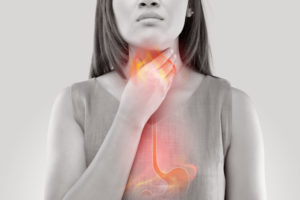Previously, we started sharing important information on hyperthyroidism and how it may affect your digestive health. Last week, we gave readers plenty of signs and symptoms of a hyperthyroid. Do not put off medical attention for stomach pain at our Orlando ENT office.
Hyperthyroid in review:
As we have said before, there are underlying issues causing stomach pains. Usually, the pains are not exactly in the stomach but really the abdomen. We began sharing about hyperthyroidism symptoms in our last article.
Now, we are going to continue sharing signs, symtoms, and causes of hyperthyroidism. Some symptoms are not located in the abdomen. For example, we mentioned that heart palpitations and rapid heart rate are both signs of hyperthyroidism.
 Anxiety, nervousness, and irritability are all symptoms of a hyperthyroid. Rapid weightless and an increase in appetite are also signs of hyperthyroidism. Patients report light tremor in their hands, sweating, increased sensitivity to heat, swelling at the base of the neck, and muscle weakness are frightening signs of this condition.
Anxiety, nervousness, and irritability are all symptoms of a hyperthyroid. Rapid weightless and an increase in appetite are also signs of hyperthyroidism. Patients report light tremor in their hands, sweating, increased sensitivity to heat, swelling at the base of the neck, and muscle weakness are frightening signs of this condition.
The swelling at the base of the neck is actually an enlarged thyroid gland. In medical terms, this is called a goiter. People report skin thinning, brittle hair, difficulty sleeping, and fatigue. Graves’ ophthalmopathy is a more rare problem that affects the eyes.
This uncommon issue happens especially to those that smoke. This disorder makes the eyeballs protrude beyond their normal protective orbits. The tissue behind the eyes swell causing the protrusion. Eye issues usually improve without treatment.
However, we are more concerned with the signs and symptoms related to digestive health. Changes in bowel movements can be caused by hyperthyroidism. People especially experience more frequent bowel movements.
What is a hyperthyroid:
Patients may seek treatment for hyperthyroidism and live a healthy, happy life. Hyperthyroidism can be caused by a number of conditions. For example, thyroiditis, Graves’ disease, and Plummer’s disease can cause hyperthyroidism.
The thyroid is at the base of the front of your neck, just below the Adam’s apple. It is a gland that has an enormous impact on a person’s health. Every single aspect of a person’s metabolism is controlled by the thyroid hormones.
There are two hormones the thyroid gland produces. They are called thyroxine, also called T4, and triiodothyronine, or T3. These two main hormones every single cell in the body.
 T3 and T4 create and maintain the rate at which your body uses fats and carbohydrates. These two hormones help control your body temperature. That is why one symptom is sensitivity to heat.
T3 and T4 create and maintain the rate at which your body uses fats and carbohydrates. These two hormones help control your body temperature. That is why one symptom is sensitivity to heat.
Also, these hormones influence your heart rate and regulate the production of protein. The thyroid gland also produces a hormone that helps regulate the amount of calcium in the blood. The medical term for that substance is calcitonin.
In a normal scenario, the thyroid releases the correct amount of hormones. Sometimes, it can produce too much T4, or thyroxine. There are a number of reasons that may cause this overproduction.
Grave’s disease is one possible cause. It is an autoimmune disorder. Antibodies produced by your immune system stimulate the thyroid to produce an excess of T4. This is the most common cause of hyperthyroidism.
However, hyper-functioning thyroid nodules, also called Plummer’s disease, is another possible cause. This type of hyperthyroidism occurs when one or more adenomas of the thyroid produce too much T4. What is an edenoma?
An edenoma is a part of the gland that has walled itself off from the rest of the gland. This forms a benign, or noncancerous, lump that may cause an enlargement of the thyroid. Next week, we are finishing up the discussion of hyperthyroidism and moving onto the hypothyroidism.
Continue on:
Make an appointment today to be seen for any change in bowel movements, abdominal pain, or any other concerns for your digestive health. If you are not having any issues, be sure to stop in for a regular exam. Now is a great time to address seemingly insignificant problems such as mild bloating or intolerances. See you soon!
Staff Writer
